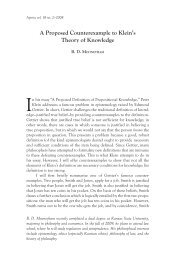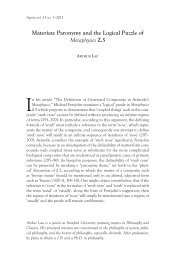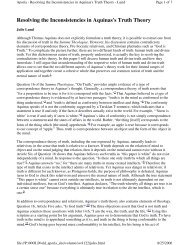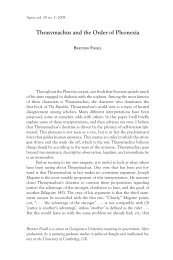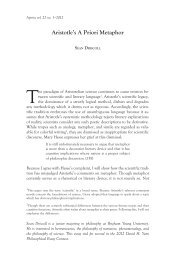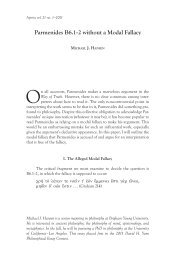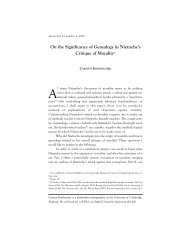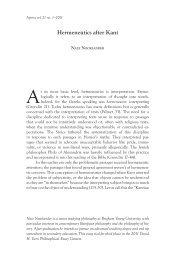How Queer? - Aporia - Brigham Young University
How Queer? - Aporia - Brigham Young University
How Queer? - Aporia - Brigham Young University
You also want an ePaper? Increase the reach of your titles
YUMPU automatically turns print PDFs into web optimized ePapers that Google loves.
16 RUSSELL FARR<br />
West is trying to destroy their people, culture, and religion. We disagree with<br />
their assessment and their methods, but we do not disagree that people<br />
should protect their people, culture, and religion. We may argue with them<br />
to try and convince them that non-violent methods are more appropriate,<br />
but we can identify with their love of their own society. Even sadists appeal<br />
to values we can understand. They inflict pain on others because it gives<br />
them pleasure. We understand why a sadist values pleasure because we<br />
value it ourselves. We non-sadists simply disagree with how the person<br />
achieves such pleasures and would say that the sadist values pleasure<br />
above more important values. We can see that the questions in many of<br />
these disagreements are either about facts or about which moral values<br />
have preeminence, not about two utterly foreign moral values.<br />
That we can even communicate about moral values with people<br />
whose moral codes clash with our own shows some consensus. Those who<br />
have differing moral codes will always justify their practices with a value we<br />
can understand. Once we realize this, Mackie’s claim to have the better<br />
explanation falters. Did people from separate communities all across the<br />
world independently happen to behave in ways that led them to idealize<br />
nearly all of the same values that all other peoples also idealized? Or is this<br />
agreement explained better by the theory that there is something about<br />
these values that draw all peoples? The disagreements are too few and the<br />
consensus is too wide for us to easily accept Mackie’s theory.<br />
Mackie also argues against objective moral values by discussing their<br />
“queerness,” claiming that objective moral values would be unacceptably<br />
queer both metaphysically and epistemically (Mackie 38). Whatever kinds<br />
of things objective moral values are, they would have to be very strange<br />
entities, so strange that we could not bear it. His metaphysical argument<br />
seems to be:<br />
(8) If there were objective values, they would be unacceptably<br />
queer.<br />
(9) Whatever would be unacceptably queer cannot exist.<br />
From lines 8 and 9 we can deduce:<br />
(10) There are no objective values.



